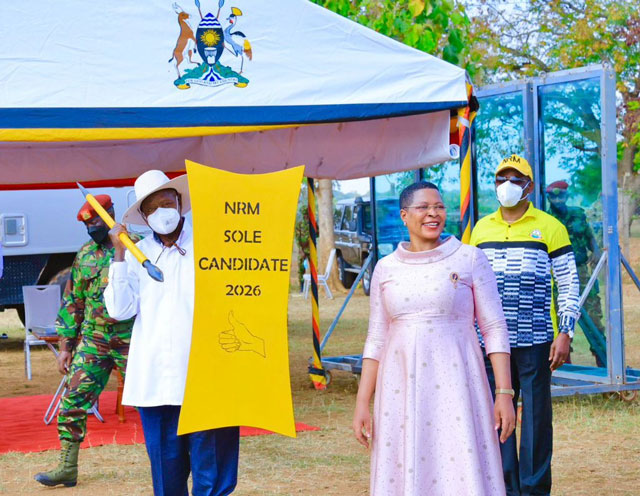
SPECIAL REPORT | THE INDEPENDENT | Researchers have published a book detailing political tactics that it says President Yoweri Museveni has utilized to rule Uganda for close to four decades.
The “Autocratization in Contemporary Uganda Clientelism, Coercion, and Social Control” was launched on Monday. It says Uganda has since the return of multiparty democracy been under an autocratic leader, Museveni.
The book takes an analysis of two interrelated outcomes: autocratisation, a manifest in the deepening of personalist rule or Musevenism, and regime residence that has made Museveni one of Africa’s current-longest-serving leaders.
It asks a centrally important question: How has this feat been possible and what has been the trajectory of Museveni’s increasingly autocratic rule? While Museveni has ruled Uganda since 1986, the book picks the period between 2005 to explain Museveni’s autocratic tendencies.
Coincidentally, the year 2005 is when Uganda returned to a multiparty system after a referendum held in July of that year. Museveni had been in power for about 26 years when the referendum was held. The referendum ended the monolithic movement system ushered in by Museveni and his NRA/NRM.
Moses Khisa and the co-authors focus on the years since 2005; bringing to the fore the “autocratic turn” placing it within a broader comparative lens, and enriching it with comparative references outside Uganda.
They come up with what they describe as “autocratic adaptability” as a defining hallmark of Museveni’s rule. It examines factors that have made autocratic adaptability possible, analyzing the dynamics around themes like institutions, resources, and coalitions. Moses Khisa spoke about this book at the virtual meeting attended by some of the academics in the political science arena.
He said that the central question in the book is “The puzzle, as we like to say in comparative politics is how it has been possible that President Yoweri Museveni has been able to rule Uganda a country that is so diverse and complex?”
“I mean all countries and societies are complicated and complex. But I think there is something about Uganda that is quite extraordinary about society as people.
Such that one man ruling for this long, is extraordinarily unique and something very puzzling worth careful investigation,” said Moses Khisa, an Associate Professor of Political Science (and Africana Studies).
How has Museveni’s rule become a lot personalist?
Khisa defines autocracy as one man’s rule but which is also highly personalist in the sense that a lot of power and authority has become extremely consolidated and centralized around the person of the president.
“So in this book, we try to pool together insights that help in illuminating the main drivers of what we call autocratisaton. Which essentially, there has been a deepening entrenchment of an autocratic rule which is one rule or one-party rule at best,” he said.
Khisa is no stranger among the academics who have written about Museveni and the means that have enabled him to stay this long in power.
In 2020, the wrote an article titled “Politicisation and Professionalisation: The Progress and Perils of Civil-Military Transformation in Museveni’s Uganda” The book has several chapters in addition to the introduction chapter of what the author called the theory chapter.
There are eleven chapters in the book, making it a fairly compressive and detailed treatment of the problem. It has three sections that speak to the three core reasons or variables that have enabled President Museveni to rule Uganda for now close to four decades.
Khisa has not lived to see any other President preside over Uganda. He testified that he was still a toddler when President Museveni took power in 1986.
“Museveni’s many long rule has been in many ways been defined by two core features. Number one, the sheer resilience and longevity that has had the president in power since 1986. We are approaching four a decade of Museveni uninterrupted is extraordinary,” said Khisa who went on to display to two portraits of President Museveni.
One portrait is for President Museveni of 1986 and the one of present-day Museveni. “You can see that these are two defilement Museveni facially. A relatively you Museveni when he had just come to power and Museveni today. And many Ugandans like pointing out that the two Musevenis if they met would engage in a bloody fight” observes Khisa
He goes on to say that there are aspects and thinking of President Museveni that have remained the same.
“But I think the man has also changed not just physically but in terms of his governance approach and philosophy” Moses Khisa is also, a Research Associate with the Centre for Basic Research in Kampala, Uganda, and a weekly columnist for the Monitor newspaper.
He equates Museveni’s rule to an imperial presidency. “In the sense that the rule is built around the person and what he wants to push through. Less institutionalized. So deinstitutionalization is very much a characteristic of Museveni’s rule”
Why a project to examine Museveni?
The scholar says part of the reason was that Museveni is one of the longest-serving presidents in Africa with most contemporaries long out of power. Khisa says Museveni’s rule is puzzling.
“Today, there are only two presidents who have been longer in power. That is Paul Biya in Cameroon and Theodore Biang of Equatorial Guinea who has been in power for 45 years,” he explained”
“So this is quite puzzling because many others as peers of Museveni have been swept aside or have left power voluntarily. And in Museveni’s case like many others has faced many challenges at different times. He has faced threats both armed and unarmed”
Khisa said one of the questions is why hasn’t been pushed aside like the case of the late Zimbabwean leader, Robert Mugabe in 2016 or Omar Bashir in Sudan. “Or why haven’t protests like Walk to Work in 2011 taken out Museveni like Blaise Compaore of Burkina Faso who was pushed out of power by a street protest?” asked Khisa
Aili Mari Tripp, a Vilas Research Professor of Political Science at the University of Wisconsin-Madison USA wrote, “This compilation of insightful essays charts the autocratization of Uganda since Museveni’s take over, effectively demonstrates how the regime has become increasingly personalized and institutionally fragmented?”
“The book shows how the longevity of the regime is a result of cooperation and coercion,” said Marri Tripp who has written a similar paper titled “How African Autocracies Instrumentalize Women Leaders” Her essay explores how authoritarian leaders in Africa came to promote women leaders and how instrumentalization of women leaders served to enhance longevity of their rule.
Her essay looked at countries like Uganda, Rwanda, Ethiopia, Burundi, South Sudan, and Somalia, which recently have passed constitutions with provisions to promote women leaders.
“In Uganda, after a brutal election in which the opposition was severely repressed, President Yoweri Museveni appointed a woman Vice president, a woman Prime Minister, and a woman deputy prime minister. He appointed a woman Speaker of Parliament after the untimely death of her predecessor. The prior speaker, who served from 2011 and 2021, was also a woman,” said Aili Mari Tripp.
Back to the compilation by Moses Khisa and others, she wrote “Each chapter examines a different set of institutions to uncover mechanisms of institutional adaptability, pervasive clientelism, and legal manipulation. Taken as a whole, the book provides a significant contribution to our understanding of how autocracy operates today in Africa” Museveni on why he has stayed on.
Uganda’s Yoweri Museveni has won a sixth term in office after the 2021 Presidential elections, with 58.6% of the vote. Museveni has always laughed off Western leaders and researchers claiming he is an autocrat.
In one of the interviews with German-based journalists, Museveni said, “Those people don’t know our position in the world. They do not know. They are just talking about things they do not know,” said Museveni.
Museveni has explained that he has stayed longer in order to wake up some Ugandans whom he said are a bit laid back from joining the money economy.
“Because here, fools can survive. Fool don’t die here. In Europe, if you are foolish you die. So here, there is a lot of work to cause social-economic transformation. Social economic change of the society,”
Museveni explained. He has explained that causing the social economic change in society is a lot of work. It is not just a matter of coming in five years and then you think you will make an impact. Secondly, by 2014 32% of our people had woken up. They were producing for the stomach and for the pocket. Eating and money,” said Museveni.
Museveni explained that because of the “waking up” the problem in Uganda is not shortage but surplus. “So because of that, we have got very serious historical bottlenecks that must be handled by all available manpower. If the people want, if the people agree, then it is correct that everybody available contributes,” said Museveni.
“But if we go just schematic, just appearing as if we a theatre, we are not in a theatre; we are in a real serious struggle to transform Africa. So that is why we want everybody if the people want” While seeming to rule out that he is an autocrat, Museveni added, “There is so much work to be done. Let everybody be available to be recruited democratically. So that if they want a strong man, you get him, if want a soft one, he is also available,” Why do you block the choice of people? If they want an old fellow, he is available,” added Museveni.
Scholars in Uganda in Uganda and the outer world have observed that while Uganda holds regular elections, fundamentally, Uganda has no functional multiparty democracy and that elections are just an end that justifies the means. They say should Museveni contest in 2026, aged 80, the election will be far from free and fair.
*****
URN
 The Independent Uganda: You get the Truth we Pay the Price
The Independent Uganda: You get the Truth we Pay the Price


